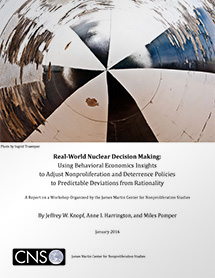January 12, 2016
The Washington, DC, office of the James Martin Center for Nonproliferation Studies (CNS) hosted a workshop organized by Jeffrey Knopf, Anne Harrington, and Miles Pomper to explore the implications of research in behavioral economics for policy issues related to nuclear weapons. The field of behavioral economics has drawn on research in psychology and neuroscience and its own experiments to identify patterns in human decision making that systematically deviate from the predictions of rational actor models. The workshop participants came from several different countries and reflected a mix of academic and think tank affiliations. Participants presented papers on topics ranging from deterrence to the nonproliferation regime to case studies of individual countries. This report summarizes the workshop discussions and the conclusions drawn by the three organizers.
The project reaffirmed long-standing insights regarding the limitations of rational actor models for understanding and predicting behavior concerning nuclear weapons. Knopf, Harrington, and Pomper concluded, however, that behavioral economics does not yet supply a fully-formed alternative model that can stand alone as an alternative framework for analyzing nuclear decisions and behavior. Instead, behavioral economics has generated several bodies of insights that have potentially major implications for crafting effective policies for dealing with nuclear dangers. These include the importance of how actors frame or understand their situations, the potentially large impact of emotions, and the recurring role of concerns about justice and fairness. Effective efforts to prevent proliferation and deter nuclear use will have to take these considerations into account alongside the more traditional focus on rational cost-benefit calculations.

